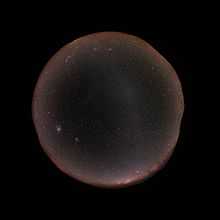Gegenschein


Gegenschein (German pronunciation: [ˈɡeːɡənʃaɪn] German for "countershine") is a faint brightening of the night sky in the region of the antisolar point.
Explanation
Like the zodiacal light, the gegenschein is sunlight backscattered by interplanetary dust. Most of this dust is orbiting the Sun in about the ecliptic plane, with a possible concentration of particles at the L2 Earth–Sun Lagrangian point.[1]
It is distinguished from zodiacal light by its high angle of reflection of the incident sunlight on the dust particles. It forms a slightly more luminous, oval glow directly opposite the Sun within the band of luminous zodiacal light. The intensity of the gegenschein is relatively enhanced, because each dust particle is seen in full phase.[2]
History
The gegenschein was first described by the French Jesuit astronomer and professor Esprit Pezenas (1692–1776) in 1730.[3] Further observations were made by the German explorer Alexander von Humboldt during his South American journey from 1799 to 1803.[3] It was also Humboldt who gave the phenomenon its German name Gegenschein.[3]
The Danish astronomer Theodor Brorsen published the first thorough investigations of the gegenschein in 1854.
In modern times, the gegenschein is not visible in most inhabited regions of the world due to light pollution.
See also
- Interplanetary dust cloud
- Earth's shadow
- Heiligenschein
- Sylvanshine
- Kordylewski cloud
- Opposition surge, the brightening of a rough surface, or an object with many particles, when illuminated from directly behind the observer
References
- ↑ Kopal, Zdeněk (June 14, 1962). "Communications on the Moon". New Scientist (291): 573.
- ↑ Levasseur-Regourd, Anny-Chantal; Hiroichi Hasegawa (1991). Origin and Evolution of Interplanetary Dust. International Astronomical Union Colloquium. p. 159. ISBN 0-7923-1365-8.
- ↑ 3.0 3.1 3.2 Sheehan, William (1995). The immortal fire within: the life and work of Edward Emerson Barnard. Cambridge University Press. pp. 69–70. ISBN 0-521-44489-6.
External links
| Look up gegenschein in Wiktionary, the free dictionary. |
- Astrophotographs of the gegenschein
- "Zodiacal Light and the Gegenschein", an essay by J. E. Littleton
- Astronomy Picture of the Day, May 7, 2008
 Chisholm, Hugh, ed. (1911). "Gegenschein". Encyclopædia Britannica (11th ed.). Cambridge University Press.
Chisholm, Hugh, ed. (1911). "Gegenschein". Encyclopædia Britannica (11th ed.). Cambridge University Press.